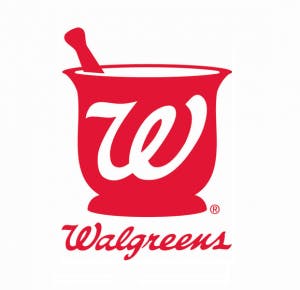
Healthcare transformation
The real profits in retail healthcare appear when deals are made between complementary companies. Walgreen Company (NYSE:WAG) was able to rebuild its relationship with Express Scripts Holding Company (NASDAQ:ESRX), and although it seemed like a gamble at the time, the stock shows no evidence of the damage from last year, as it’s already up 38% in 2013. Although the terms of the deal were not disclosed, the point is that Walgreen is once again filling prescriptions for Express Scripts Holding Company (NASDAQ:ESRX)’ vast pool of consumers, and likely at a higher price.
Prior to the agreement, Walgreen Company (NYSE:WAG) had refused to fill “unprofitable prescriptions.” The two companies don’t share the friendliest of relationships, but Express Scripts Holding Company (NASDAQ:ESRX) needs the customer loyalty that Walgreen can provide, with the hopeful result being a sales climb for both based on volume. This paid off, because unlike its rival CVS Caremark Corporation (NYSE:CVS), which has its own Caremark Pharmacy Services subsidiary, Walgreen continues to define its boundaries with its insurance liaison without exclusive control of ExpressScripts. It also remains free to explore other profitable options if necessary.
Starting with Take Care Clinics, Walgreen Company (NYSE:WAG) is monetizing the healthcare crisis in the US. Not enough doctors, Obamacare, and skyrocketing costs for both the government and for individuals are a problem. Walgreen offers services such as vaccines, physicals, care for more serious conditions such as pink eye, and assistance for accidents such as minor cuts and wounds. Insurance is always the primary payment option, but the drug store chain allows customers to pay out-of-pocket at prices more affordable than at hospitals. Just as Wal-Mart Stores, Inc. (NYSE:WMT) and Target aim to keep prices low for everyday goods, Walgreen intends to keep costs lower for healthcare.
The most important step in developing these clinics is the planned increase of nurse practitioners (NP) and physician assistants (PA), both of which are at record demand. Unless college graduates begin to assist at a faster rate, the pool lies in temps. A reported 10% of the total requests of Staff Care, a healthcare staffing company, was for temporary PA’s and NP’s. However, when it comes to schedules, benefits, pay, and overall lifestyle, a company such as Walgreen Company (NYSE:WAG) will be able to offer more than a couple of paychecks at a hospital. There’s nothing wrong with working for hospitals and urgent care centers, but large retail establishments merging with healthcare providers may find a niche that’s beneficial for both the company and the employee.
When you enter a store such as The Home Depot, Inc. (NYSE:HD), you can find an expert on paint, kitchens, tools, and many other store offerings. In a Walgreen Company (NYSE:WAG) store, the idea is to offer a pharmacist to provide drug assistance, a physician assistant to perform physical exams, and a nurse practitioner who can diagnose patients. This team-based, customer-centered approach to acute and chronic problems that plague the country could be a gold mine, and the sources of the profits shown here.
Building a brand
Companies that sell over-the-counter medication may have benefited from the sluggish economy because of their ability to sell a generic, store brand version of just about everything. Beyond health and wellness items, the same can now apply to grocery items at Walgreen with the marketing of it’s own brand, Nice!. Nearly every grocery establishment, including competitor CVS Caremark Corporation (NYSE:CVS), has its own premium brand, but even on a light wallet people want quality.
Taking a nod from the time-tested convenience store model, Walgreen has begun to offer a cafe environment in its urban stores. Starting with its Duane Reade locations in New York City, Upmarket offers fresh sandwiches, produce, and a wide selection of beverages. It might sound more like a quick-stop than a drugstore, but Upmarket still fits the Walgreen mission, focused on beauty, health, and convenience.
Brand development has paid off for Walgreen Company (NYSE:WAG), trading at a premium P/E of 22 compared to that of CVS Caremark Corporation (NYSE:CVS) at just over 18. Neither stock is a steal, but because of this heavy investment in healthcare, it shouldn’t be a surprise. However, with CVS being a much larger company in terms of market cap and sales, the dividend of about 1.5% isn’t too attractive. CVS Caremark Corporation (NYSE:CVS) has less debt and higher cash flow, but company investments and growth appear to be lagging behind the competition, at least in the public eye. The late aggressive growth of Walgreen may spur CVS Caremark Corporation (NYSE:CVS) to follow suit, awarding any investors in either company for the long haul.
With key and numerous locations for commuters and travelers, Walgreen Company (NYSE:WAG) looks to capture loyalty in more areas than allergy relief. The company is building a gradual, strong foundation that will withstand market swings and likely lead to future increases of its 2.3% dividend. Walgreen’s path is attractive for the long-term investor.
The article OTCs and then Some originally appeared on Fool.com and is written by Kyle Vaughan.
Kyle Vaughan has no position in any stocks mentioned. The Motley Fool recommends Express Scripts. The Motley Fool owns shares of Express Scripts. Kyle is a member of The Motley Fool Blog Network — entries represent the personal opinion of the blogger and are not formally edited.
Copyright © 1995 – 2013 The Motley Fool, LLC. All rights reserved. The Motley Fool has a disclosure policy.
